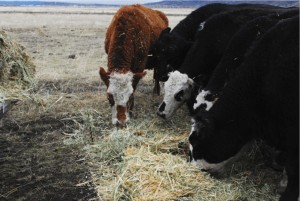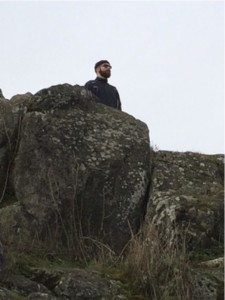By Emmie Harcourt
Over the last five months, I’ve found myself in a number of unexpected situations as I adjusted to life in Oregon’s Outback. I’ve woken up early to help my landlord feed his cows only to discover that this entails filling the back of a pickup truck with hay, putting the truck in first gear, and everyone piling out, driver included. I’ve found myself as a visitor at a men’s prison, where I spent the afternoon learning about a garden program for inmates and ate my first prison meal. I’ve attended the weekly bingo game at the local senior center, handed out cans of green beans for Thanksgiving, and interviewed produce stand owners who would look more at home at a motorcycle rally. All of these things have been part of conducting a Community Food Assessment, or CFA, for Lake County, located in the hay and cattle country of the high desert. The CFA is a grassroots, participatory research process that focuses on both the current assets and challenges of a local food system with the hopes of informing future projects aimed at improving it.
This has taken the form of community meetings, interviews, surveys, and informal conversations over the first half of my term of service, and I am sure the process will continue to change over the course of the second. Overall, it rests on the premise that a community knows what will and won’t work for it, and my role is largely to listen to those community ideas (and complaints) and create connections between existing groups.
I’ve spent a lot of time reflecting on this process recently. Yesterday, while interviewing an employee at the local senior center, I stayed to join her for one of the community meals offered at the center three times a week. As we talked about issues affecting senior nutrition and food security, we also started to talk about the process of working with the community in our respective roles. She said something that I have also found to be very true so far, which is that relationships are the most important part of doing this kind of work. She told me that she often has to speak with someone five to six times before they are willing to really work with her, and I have likewise found that I have had to establish myself as a part of the community before being able to accomplish many of the tasks that I’ve set out to do. While this process can seem frustrating and slow-moving at times, I think that it has been essential for my position, especially in a place where “government official” could be hurled as an insult. So while it may not seem immediately apparent how handing out green beans or attending a bingo game can benefit a local food system, what it does is build the relationships and trust necessary to create a truly community-based process, which will hopefully lead to a Community Food Assessment that will continue to be useful to Lake County residents after my term of service is complete.
Emmie Harcourt
Emmie received her Bachelor of Arts in Anthropology from the University of Missouri. After obtaining her degree, Emmie worked as a museum interpreter for the Missouri State Museum leading educational tours and researching and designing new museum programs for teens. Prior to that, Emmie worked as a research intern for the Bureau of Applied Research in Anthropology at the University of Arizona where she conducted qualitative research and compiled reports at two urban farms while maintaining an intern-run garden plot. After her term of service with the RARE Program, Emmie hopes to combine her interests in cultural anthropology and sustainable agriculture while pursuing a master’s degree in applied anthropology, focusing on food system research. She hopes that her time spent serving with Lake Health District will help her to better articulate her particular research interests while gaining more experience with community-based, participatory research methods and community organizing.

